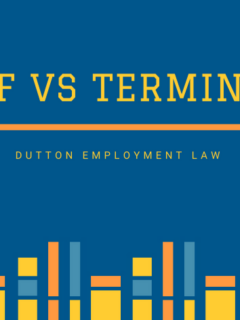Being terminated for cause means the employee was terminated for serious incompetence or serious misconduct, and, accordingly, no notice (i.e. severance) must be given to the employee upon his or her dismissal. In addition, employees terminated for cause could be refused Employment Insurance (“EI”): Source Nevertheless, not every allegation of cause is truly cause. In …
Terminations
Employees who quit are not entitled to severance. Employees only get a severance package if they are fired. Accordingly, in terms of money, it is better to get fired than to quit. You get money if you are fired. You don’t get money if you quit. It is that simple. With regard to the negative …
Termination Meaning Termination means one’s employment has come to an end with his or her employer, permanently. In other words, “termination” is a more professional word to say that an individual has been “fired”. Getting “terminated” sounds better than getting “fired”, so that’s why employment lawyers use the word “termination” instead of “fired”. But both …
Layoff and termination difference What is the difference between a “layoff” and a “termination”? Is there are any difference between being “laid off” vs being “terminated”? Yes, there is a big difference between being “laid off” vs being “terminated”. A layoff is a temporary stoppage of work while termination is a permanent stoppage of work. …
Interested in how to explain termination without cause? Want to learn if you can sue for a termination without cause? Read this article below to learn about everything to do with a termination without cause. What is a termination without cause in Ontario? If an employer terminates an employee without cause, it means they don’t have …
As an employment lawyer who offers a consultation service, I have spoken with tens of thousands of people who were just terminated from their job. I have learned how they feel and I have learned ways in calming and collecting them. In addition, in my life, of course, like almost everyone else, I have been …





